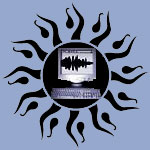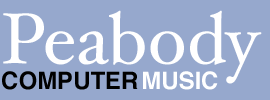|
| |||||||||||
|
|||||||||||
 |
 |
|
|||||||||
PCM FacilitiesThe combined computer music studios serve as a working laboratory for music composition and research, as well as a center for courses, demonstrations, and public programs. Many projects use both analog and digital facilities. Peabody's activity in electronic (analog) music began with summer workshops for teachers first held in 1967. When the Peabody Electronic Music Studio opened officially in 1969, it was the first such studio in Maryland, and one of the first in the country to be located in a conservatory. Over the years, its facilities have been systematically updated and expanded. The affiliation of Peabody with The Johns Hopkins University has made possible expansion into the field of computer music, utilizing the computers, advanced technology, and computer expertise available at Johns Hopkins. In addition to Peabody courses in computer music, Conservatory students have access to University courses in computer science, electronics, and related fields. The Peabody Computer Music Department has two on-campus computer music studios, several computer music workstations, and a variety of off-campus resources available to students. The two departmental studios feature a wide variety of music technologies including MIDI, Direct Digital Synthesis, SMPTE synchronization, and multi-track recording. The Teaching Studio is intended primarily for introductory-level and non-major students, and is also used as an additional production facility by departmental graduate students and faculty. The room doubles as the department's primary classroom. A Macintosh Power PC computer is the heart of this facility and is used to run a wide variety of commercial and non-commercial software for MIDI applications, software synthesis, sample editing, music notation, and more. A collection of MIDI-based synthesizers and processing units, as well as vintage Moog analog synthesizers (maintained for historical and pedagogical purposes), is available for student use. Eight-track digital recording and 24x8-track facilities are available. The Production Studio is intended for use by Computer Music graduate students and faculty. It is a fully professional environment designed for high level production and research, especially psychoacoustic research. This studio is centered around a Macintosh Power PC computer which is used to run commercial and noncommercial software for MIDI, software synthesis, real-time control of equipment and more. High-quality professional digital-to-analog and analog-to-digital converters for sound recording, analysis and playback are available. The Production Studio features a variety of MIDI-based synthesizers and signal processing devices. Eight-track digital recording and 24x16-track mixing facilities are available. The Production Studio features a high-quality stereo monitoring system including Meyer 833 Studio Monitor Speakers and a Bryston 4B power amplifier. In addition, a video cassette recorder and monitor are available for basic video work. Workstations. The Department maintains several other music workstations including a NEXT, two Sun Sparcs, and various Macintoshes. They are used for both MIDI processing and digital synthesis. Studio Interconnections. Departmental facilities are interconnected in a variety of ways. Audio and MIDI tie lines connect the two studios, allowing instruments in one room to be used remotely from another. An ethernet-based computer network allows communication between all departmental computers and printers. Laser printing is available for music manuscripts. |

Computer Music
Peabody Conservatory Computer Music Department | ||



